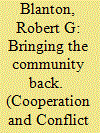|
|
|
Sort Order |
|
|
|
Items / Page
|
|
|
|
|
|
|
| Srl | Item |
| 1 |
ID:
069086


|
|
|
| 2 |
ID:
049863


|
|
|
|
|
| Publication |
New York, garland Publishing, Inc., 1998.
|
| Description |
xiii, 212p.
|
| Standard Number |
0815333331
|
|
|
|
|
|
|
|
|
|
|
|
Copies: C:1/I:0,R:0,Q:0
Circulation
| Accession# | Call# | Current Location | Status | Policy | Location |
| 044674 | 337/BLA 044674 | Main | On Shelf | General | |
|
|
|
|
| 3 |
ID:
117853


|
|
|
|
|
| Publication |
2012.
|
| Summary/Abstract |
A burgeoning body of literature assesses the sociopolitical factors that influence investment decisions, including the nature of domestic institutions, societal rights, and participation in international institutions and agreements. Oddly enough, these have evolved largely as separate lines of research, and little effort has been made to compare the relative importance of these sociopolitical factors in making investment decisions. Moreover, though the diverse nature of foreign direct investment (FDI) is widely noted, extant research relies almost exclusively upon the examination of aggregate FDI. As a result, scholars have little insight into the ways that investors prioritize these factors, or how they vary across different industries. In an effort to synthesize these strands of research and further deepen our understanding of the determinants of investment decisions, this study models the prospective impact of several sociopolitical variables that have been found to significantly influence FDI-human rights, democratic governance, and commitment to international trade agreements and investment treaties-across multiple investment sectors.
|
|
|
|
|
|
|
|
|
|
|
|
|
|
|
|
| 4 |
ID:
089045


|
|
|
|
|
| Publication |
2009.
|
| Summary/Abstract |
While there is a considerable degree of consensus about the economic determinants of foreign direct investment (FDI), the role of socio-political factors has only recently come under scrutiny. In this study, we build upon research on one such factor, human rights. Specifically, whereas extant research into FDI examines aggregate investment indices, we seek to disaggregate the analysis of FDI to further assess the role of human rights, namely physical integrity rights, in investment decisions. As FDI is a heterogeneous enterprise, we posit that the importance of human rights varies in part due to the nature of the industrial sector. In particular, two factors that vary across industrial sectors-skill requirements and the degree to which societal acceptance or "social license" is sought-likely increase the salience of human rights concerns in investment decisions. To empirically assess these linkages, we analyze U.S. FDI across 10 different sectors. We find human rights to be a significant determinant of FDI across sectors that value higher skills and integration within the host society.
|
|
|
|
|
|
|
|
|
|
|
|
|
|
|
|
| 5 |
ID:
145734


|
|
|
|
|
| Summary/Abstract |
As is commonly the case with interdisciplinary programs, International Studies (IS) programs often have an “identity crisis,” particularly in institutions dominated by traditional academic departments. At the same time, these programs continue to flourish; in some cases, IS programs service as many or more students than many traditional departments. The rapid growth of these programs, and the vast diversity of ways in which they are administered, raises the question of what specific factors contribute to program success. Utilizing a comprehensive database of all IS programs across the country, we survey program directors to uncover some of the key factors and practices that contribute to program success. In addition to providing systematic insights into IS as a field of study, we also contribute to a better understanding of how interdisciplinary programs can flourish within their home institutions, and provide some guidance for ascertaining “best practices” in our field of study.
|
|
|
|
|
|
|
|
|
|
|
|
|
|
|
|
| 6 |
ID:
119406


|
|
|
|
|
| Publication |
2013.
|
| Summary/Abstract |
Interest in zombies is booming across campuses. International Relations (IR) scholars have likewise begun to pay attention to the undead, as the zombie invasion scenario-envisioned in a variety of movies, television shows, and books-brings to bear many of the key issues and controversies of international relations theory. Here I provide some concrete suggestions for incorporating zombies into undergraduate classes. Drawing from a leading book in this genre (World War Z), I sketch out some of the ways that the zombie wars can be applied to key issues taught in introductory-level IR classes. I then provide specific suggestions to incorporating these insights into the classroom, including discussion guides and simple role-playing exercises.
|
|
|
|
|
|
|
|
|
|
|
|
|
|
|
|
|
|
|
|
|